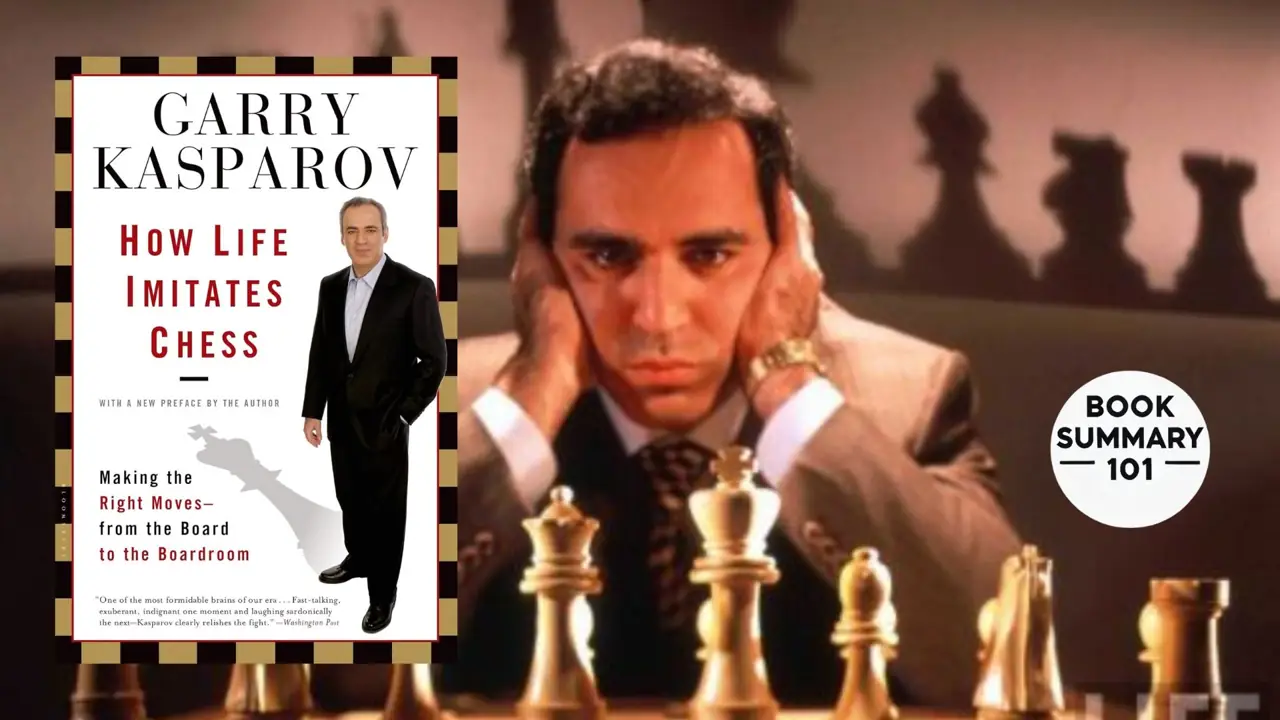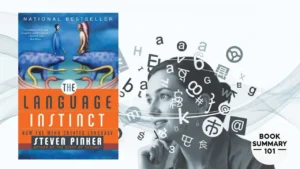If you think chess is just a game, think again. In How Life Imitates Chess: Making the Right Moves, from the Board to the Boardroom, Garry Kasparov—world chess champion and one of the greatest strategists of our time—reveals how the skills honed on a chessboard can apply to our personal and professional lives. Kasparov isn’t just talking about chess moves; he’s showing us how to outsmart challenges, anticipate opponents, and make confident decisions in high-stakes situations.
Kasparov has spent decades in a world of mental combat, and this book is a blend of chess strategy, personal insight, and actionable advice. Let’s dive into the main lessons from How Life Imitates Chess and explore why this book can be a game-changer, whether you’re in the boardroom, building a business, or tackling life’s everyday challenges.
Why Read This Book?
At its core, How Life Imitates Chess is about developing a strategic mindset. Kasparov believes that thinking strategically can give us the upper hand, whether we’re playing a game of chess or navigating the workplace. In the book, he discusses not only the mental tactics that made him a chess champion but also the philosophies and insights he’s applied in his life outside the game.
If you’re looking for practical strategies to make better decisions, think ahead, and manage complex situations with confidence, this book is for you. Kasparov combines his experience with broader life lessons to show that strategy is the ultimate tool for achieving our goals and handling challenges.
Key Lessons from How Life Imitates Chess
Kasparov’s book offers a wealth of insights, with each lesson revealing valuable strategies for approaching life’s challenges. Let’s break down the key takeaways in more detail, exploring how these lessons can enrich our decision-making, boost our adaptability, and empower us to play the game of life with confidence and clarity.
The book on amazon 👉 How Life Imitates Chess 📚
Know Your Strengths and Weaknesses
Kasparov believes that true success begins with self-knowledge. Just as every chess piece has specific strengths and limitations (the queen’s versatility, the knight’s unique movement, the king’s vulnerability), so do we. By understanding what we’re naturally good at and where we struggle, we can create strategies that play to our strengths and minimize our weaknesses.
He suggests that self-awareness should be our first step in strategic thinking. Self-knowledge allows us to choose roles and projects where we can thrive and avoid areas that don’t align with our skills. Kasparov notes that many people get trapped in situations where they’re constantly working against their natural inclinations, leading to stress and underperformance.
To help with this, Kasparov advises honest reflection, feedback from others, and even personality assessments if needed. By seeing ourselves clearly, we can avoid overconfidence in areas where we’re weak and focus on becoming even better where we’re strong. Ultimately, understanding our own capabilities is the foundation of personal and professional success.
Takeaway: Regularly assess your strengths and weaknesses. Make an effort to apply your unique talents in your work, relationships, and personal growth, and don’t be afraid to seek feedback to refine your understanding of where you excel and where you could improve.
Learn to Think Ahead
One of the reasons Kasparov became a world chess champion is his ability to visualize several moves ahead, anticipating his opponent’s responses and adjusting accordingly. In life, this translates into forward-thinking and planning. Kasparov encourages us not to limit our focus to the next immediate action but to look beyond, considering multiple possible outcomes and preparing for each.
In chess, top players think in terms of sequences, anticipating an opponent’s move, then their response, and so on. In life, Kasparov believes the same principle applies: decisions are rarely isolated, and we should be mindful of the ripple effects our choices can create. He urges us to look at both the immediate and long-term impact of our actions.
For example, if you’re launching a business, don’t just think about your initial product launch—consider how the market might change, how competitors could react, and what you’ll need in place to grow over the next few years. Thinking ahead like this helps you make decisions that keep you agile and ahead of the game.
Takeaway: Build the habit of visualizing multiple steps into the future. Whether you’re planning a personal project or making an important decision at work, consider possible responses and outcomes. Thinking this way prepares you to act decisively and pivot smoothly when challenges arise.
Adaptability is Key
Kasparov reminds us that no chess match goes exactly as planned, and the same is true in life. An opponent may make an unexpected move that throws our entire strategy off course, and we’re forced to adapt or risk losing the game. Kasparov emphasizes the importance of flexibility and adaptability, particularly in today’s fast-paced world.
In How Life Imitates Chess, Kasparov shares personal stories from his chess career, where he often had to abandon his initial strategy and improvise to keep up with a rapidly changing situation. This experience taught him that rigid thinking could be disastrous and that it’s better to adjust on the fly than to cling stubbornly to a failing plan. Whether we’re dealing with career changes, economic shifts, or unexpected life events, our ability to adapt is what allows us to survive and even thrive.
Takeaway: Practice being adaptable in your day-to-day life. When you encounter unexpected obstacles, approach them as opportunities to adjust and grow, rather than setbacks. The more adaptable you are, the more resilient and resourceful you’ll become.
Take Calculated Risks
Kasparov is known for his bold, sometimes surprising, moves on the chessboard. But he’s quick to clarify that these aren’t reckless decisions—they’re calculated risks, backed by extensive planning and insight. In life, Kasparov advocates for a similar approach: take risks, but be intentional and strategic about them.
He explains that calculated risks involve a deep understanding of the potential rewards and consequences. Whether it’s investing in a business, pursuing a new job, or making a significant life change, Kasparov stresses that we should weigh the risks realistically, evaluate the possible outcomes, and only proceed when the potential gains outweigh the risks.
Kasparov’s perspective on risk is refreshing. He encourages us to step out of our comfort zones, but with a clear head. Playing it safe might keep us comfortable, but without risk, we’re unlikely to achieve extraordinary success. By carefully assessing each situation, we can build the confidence to take leaps that propel us forward, without gambling everything on a whim.
Takeaway: Don’t shy away from risk, but don’t dive in blindly either. Assess the stakes, know what’s at risk, and consider both the worst-case scenario and the potential payoff. When you’ve weighed everything, have the courage to act.
Never Stop Learning
Kasparov credits much of his success to an insatiable curiosity and a lifelong commitment to learning. In chess, players must constantly study new strategies, learn from past games, and refine their skills. Kasparov emphasizes that this learning mentality is just as essential outside of chess; the moment we stop learning, we stop growing.
The key, he says, is to develop a “beginner’s mind”—an attitude that keeps us open to new ideas and insights. Whether it’s improving a skill, understanding new technologies, or learning about different industries, continuous learning keeps us adaptable and helps us stay ahead of the curve. Kasparov points out that even when he was at the peak of his career, he never stopped studying chess theory, analyzing matches, and learning from others in the field.
In our personal and professional lives, continuous learning enables us to stay relevant, motivated, and prepared to tackle whatever challenges arise. Kasparov’s advice is to embrace new experiences and actively seek opportunities to grow, no matter how successful we may already feel.
Takeaway: Cultivate a learning mindset. Read books, take courses, and seek mentorship. Approach each day as a chance to learn something new, and don’t be afraid to step outside your comfort zone to acquire fresh skills and perspectives.
Real-Life Examples
Kasparov doesn’t just stick to theoretical advice; he shares real-life examples from his chess career and beyond. For instance, he recounts matches where he lost because he failed to adapt to his opponent’s unexpected moves. These moments taught him to be more flexible and not to rely solely on a predetermined strategy. Similarly, he describes his experience transitioning from chess champion to political activist, where he applied chess principles of adaptability and risk assessment in a whole new context.
He also references other notable figures, like Steve Jobs, who had a clear vision for Apple but also knew when to change direction if a product wasn’t working. These examples show how strategic thinking, adaptability, and a willingness to take calculated risks can lead to success in any field.
Final Thoughts
In How Life Imitates Chess, Kasparov reminds us that strategic thinking isn’t just for chess players; it’s a powerful tool for anyone aiming to make better choices and create a successful, fulfilling life. From understanding our strengths to staying adaptable, each lesson he offers is a stepping stone toward achieving our goals.
Kasparov’s insights encourage us to be more intentional with our actions, more prepared for challenges, and more confident in our ability to navigate the game of life. Whether or not you’ve ever set foot on a chessboard, his principles are accessible and applicable, pushing us to think deeper, act smarter, and approach life with the precision of a true strategist.
Join the Conversation!
How Life Imitates Chess isn’t just for chess enthusiasts or business professionals—it’s for anyone looking to think smarter, be more strategic, and feel more confident in their decisions. Kasparov’s insights remind us that life is like a game, and while we can’t control every outcome, we can control our approach and improve our odds of success.
Have you read How Life Imitates Chess? Did any of Kasparov’s lessons resonate with you? Share your thoughts and join the conversation—let’s talk about how we can all be a little more strategic in the game of life!
The book on amazon 👉 How Life Imitates Chess 📚
how life imitates chess quotes :
Here are five powerful quotes from How Life Imitates Chess by Garry Kasparov:
- “The ability to adapt is as important as the ability to plan.”
Kasparov emphasizes that no matter how well we strategize, unexpected challenges will arise. The key to success isn’t just having a plan—it’s being able to adjust when things don’t go as expected. - “You must always be prepared to re-evaluate your position and change your strategy.”
Sticking rigidly to one approach can lead to failure. Whether in chess, business, or life, we have to be willing to shift gears and find new paths to success. - “Taking risks is part of life, but they must be calculated risks—not reckless gambles.”
Kasparov teaches that bold moves can lead to great rewards, but only if they are carefully considered. Thoughtful risk-taking is what separates successful strategists from those who fail. - “Champions are not made by playing it safe.”
Greatness comes from stepping outside your comfort zone and pushing yourself beyond what feels easy. Safe moves might keep you in the game, but bold moves win the game. - “Winning is not a matter of luck; it is a matter of making the right decisions consistently.”
Success isn’t random—it comes from practicing good decision-making over and over again. The better your choices, the better your chances of achieving your goals.
Each of these quotes reflects the deep strategic wisdom that Kasparov shares throughout the book, offering timeless lessons for thinking ahead, adapting to challenges, and making smart decisions in all areas of life.



